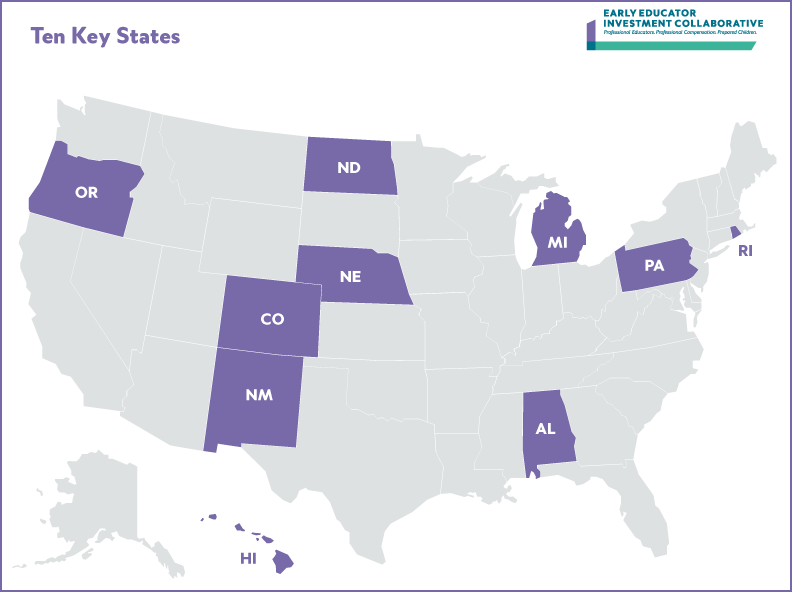Stay Connected
Stay up-to-date with our latest research and insights. We do not share or sell email addresses to outside parties. We will use your email address only to send you relevant content, and you can unsubscribe at any time.


Overview

In early 2019, The Collaborative engaged the Center for the Study of Child Care Employment, Bellwether Education Partners, and the National Institute for Early Education Research (NIEER) to provide an analysis of existing opportunities and challenges facing educator preparation programs and state competency and compensation policies across the country. This research collaboration resulted in an initial landscape review of trends, gaps, and potential opportunities across all 50 states. Following this preliminary review, we engaged the team to conduct an in-depth study of ten key states, as seen on the map. Combined, the studies provide a wealth of information to not only inform grantmaking strategies, but to shape research, practice and advocacy efforts for everyone in the field.
Our research shows that a comprehensive national strategy is required to drive states’ policy efforts and investments, which are largely driven by federal grants. And within states, policies that relate to early childhood workforce qualifications influence educator preparation offerings. Without adequate resources and clear policies for reform, many stakeholders indicated their state ECE communities and leaders struggle to determine which needs to prioritize. Lacking a clear blueprint for reform, they instead rely on the “stars aligning” around discreet, small-scale policies and reforms at the state level. In the absence of a national strategy and adequate resources, each state continues to pursue their own, varied strategies, but often in piecemeal ways that hinder progress.
Research Studies
This work resulted in three reports, available below. While this research was conducted before the COVID-19 pandemic, the crisis has only made the situation worse, with many states unsure about how to rebuild the early childhood workforce lost to the effects of the pandemic—and how to incentivize the present workforce to remain in the profession. COVID-19 has laid bare the consequences of a patchwork professional development and compensation system that isn’t meeting the needs of our country’s children, families, employers or educators. These research studies illuminate the causes and point toward solutions.
50-State Early Educator Policy and Practice Research. A comprehensive exploration of issues the field faces to determine why states struggle to make progress for the early educator workforce, where progress should be made and what barriers need to be overcome—such as a lack of quality data and an inadequate understanding of where the funding is going and how it’s being used.
Early Educator Preparation Landscape. A detailed look at on-the-ground experiences that demonstrate why reform is so difficult, providing insight into how the field effects change, particularly as circumstances become increasingly dire.
Early Educator Preparation and Compensation Policies: Voices from 10 States. A deeper look at educator preparation systems—their role in the early care and education system and why institutions of higher education and states need to consider this key component.
Looking Forward
The COVID-19 crisis created the necessity to re-imagine a more comprehensive system that delivers on the promise of high-quality early childhood education, provides the supports families need to thrive and the conditions that allow all early educators to thrive as well. This is an opportunity to make progress despite these difficult times. Parents and policymakers are experiencing the harsh realities of the current early education system more acutely than ever before, and the harm being done to early educators has intensified. Crucial conversations are happening, important stories are being told and people are looking for solutions at the federal, state and local levels.
Let’s seize this moment to move forward with new policies that reflect the value of early childhood educators and their contributions. Our hope is that these reports shine a light on the realities of the system and lead to action. The field can use this evidence-based understanding to move forward in a comprehensive and strategic way to:
We hope that you find these resources useful and join us as we continue the critical journey of improving early educator professional development and compensation across the nation.
Stay up-to-date with our latest research and insights. We do not share or sell email addresses to outside parties. We will use your email address only to send you relevant content, and you can unsubscribe at any time.